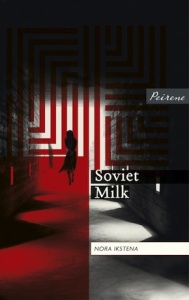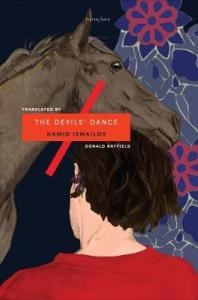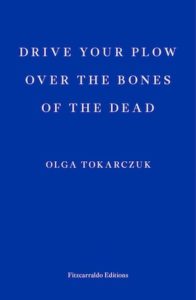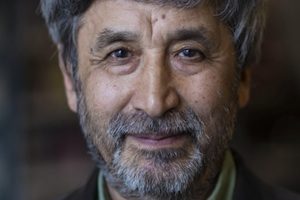First impressions
by Nora Ikstena, Olga Tokarczuk and Hamid IsmailovNovels from Latvia, Uzbekistan and Poland competed for the 2019 EBRD Literature Prize, established by the London-based European Bank for Reconstruction and Development to celebrate the best fiction in translation from the 38 territories where the bank invests, from Morocco to Mongolia, Estonia to Egypt. The judges were journalist and founder-director of the European Literature Network Rosie Goldsmith, poet, playwright and novelist Gabriel Gbadamosi, Southbank Centre Head of Literature and Spoken Word Ted Hodgkinson, and translator and founding editor of Words Without Borders Samantha Schnee.
 Here’s a brief taster of each of the contenders:
Here’s a brief taster of each of the contenders:
Soviet Milk
by Nora Ikstena
I don’t remember 15 October 1969. There are people who swear they remember their birth. I don’t. It’s likely that I was well positioned in my mother’s womb, because the birth was normal. Not particularly long, or particularly short, with the last contractions coming every five minutes. My mother was twenty-five, young and healthy. Her mental state, though, was not so healthy, as I learned later.
I do remember, or at least I can picture, the golden, tender calm of October, alternating with forebodings of a long period of darkness. It’s a kind of boundary month, at least in the climate of this latitude, where seasons change slowly and autumn only gradually gives way to winter.
Probably leaves were falling, and our bad-tempered concierge raked them up in the courtyard. She had come from Kyrgyzstan with her family and been allocated a flat in our building at 20 Mičurina Street. Her slant-eyed little girl sat on the windowsill, slurping borscht and cheerfully inviting everyone into their home. The pre-war grandeur of the flat had been modified to reflect the Kyrgyz woman’s idea of beauty. The previous inhabitants, a Jewish family, had abandoned the flat in 1941, when deportation to Siberia saved them from having to wear yellow stars on their backs a few months later, in Nazi-occupied Riga. Now heavy rugs covered the parquet, the porcelain dishes were filled with sunflower seeds and spittoons stood on the piano lid. Times and religions had commingled. And that’s how it was in the entire building, when I was carried up to the thirteenth flat, carefully swaddled like a chrysalis, as was the custom in those times.
translated from Latvian by Margita Gaelitis
Read our review of Soviet Milk
The Devils’ Dance
by Hamid Ismailov
‘My dear Abdulla, you’re a writer. And the sort of writer, as Cho’lpon liked to say, that would not be born to an Uzbek mother in a hundred years. Why don’t you write about all this?’ Fitrat exclaimed the next day.
 ‘About all what?’ Abdulla replied.
‘About all what?’ Abdulla replied.
‘The situation here, of course,’ Fitrat replied, waving his hand around him.
‘It’s not as if I’ve been sent here on creative leave,’ Abdulla demurred.
‘Well, that’s fair enough. But if you had the opportunity to write about it, wouldn’t you?’
‘Who knows? Anyone who’s gone through something similar himself will take it with him to the grave. Anyone who hasn’t will simply say “There but for the grace of
God!” I’d say that there’s nothing here one can make literature out of.’
‘You’re giving an answer from a professional point of view; my question was from a human one.’ In any conversation with Fitrat, even an ordinary exchange would run into difficulties. Meanings would multiply, merge and divide, and the result, like any equation, would end as a zero sum.
‘Very well, from the human point of view: there is death here, but no love. It’s hard to make literature out of nothing but death; that’s why I wouldn’t write about this place.’
translated from Uzbek by Donald Rayfield (with John Farndon)
Drive Your Plow Over the Bones of the Dead
by Olga Tokarczuk
The Commandant was an obese man of about my age, but he addressed me as if I were his mother, or even his grandmother. He cast me a fleeting glance and said: ‘Sit yourself down.’
 And sensing that this form of address revealed his rural origins, he cleared his throat and corrected himself: ‘Take a seat, madam.’
And sensing that this form of address revealed his rural origins, he cleared his throat and corrected himself: ‘Take a seat, madam.’
I could almost hear his thoughts – to his mind I was definitely a ‘little old lady’, and once my accusatory speech was gathering strength, ‘a silly old bag’, ‘crazy old crone’, or ‘madwoman’. I could sense his disgust as he watched my movements and cast (negative) judgement on my taste. He didn’t like my hairstyle, or my clothes, or my lack of subservience. He scrutinized my face with growing dislike. But I could tell a lot about him too – I could see he was hot-tempered, that he drank too much and had a weakness for fatty foods. During my oration his large bald head gradually reddened from the back of his neck to the top of his nose, and visible knots of dilated blood vessels appeared on his cheeks, like an unusual army tattoo. He must have been accustomed to giving orders and being obeyed, and was easily carried away by Anger. A Jovian personality.
translated from the Polish by Antonia Lloyd-Jones
 Nora Ikstena is one of the most visible and influential prose writers in Latvia. She published her first novel, Celebration of Life, in 1998 and has written over twenty books since. She has won numerous awards, such as the Order of the Three Stars for Services to Literature and the Baltic Assembly Prize. Soviet Milk, her most recent novel, won the 2015 Annual Latvian Literature Award (LALIGABA) for Best Prose. She has also helped establish the Latvian Literature Centre.
Nora Ikstena is one of the most visible and influential prose writers in Latvia. She published her first novel, Celebration of Life, in 1998 and has written over twenty books since. She has won numerous awards, such as the Order of the Three Stars for Services to Literature and the Baltic Assembly Prize. Soviet Milk, her most recent novel, won the 2015 Annual Latvian Literature Award (LALIGABA) for Best Prose. She has also helped establish the Latvian Literature Centre.
Author portrait © Aiga Redmane
Margita Gailitis is a poet and translator. She has translated some of Latvia’s finest poetry and prose into English, including Sandra Kalniete’s With Dance Shoes in Siberian Snow and Māra Zālīte’s Five Fingers. Gailitis’ own poetry has been widely published and has won her awards from both the Canada Council for the Arts and the Ontario Arts Council.
Soviet Milk is published by Peirene Press.
“An invaluable memoir of Latvia’s recent past… it is also one of the most devastating novels I’ve ever read about women’s lives in any society.” EBRD Prize Jury
Read more
 Hamid Ismailov is an Uzbek journalist and writer who came to the United Kingdom in 1992 and took a job with the BBC World Service. Several of his Russian-original novels have been published in English translation, including The Railway, The Dead Lake, which was longlisted for the 2015 Independent Foreign Fiction Prize, and The Underground. The Devils’ Dance is the first of his Uzbek novels to appear in English.
Hamid Ismailov is an Uzbek journalist and writer who came to the United Kingdom in 1992 and took a job with the BBC World Service. Several of his Russian-original novels have been published in English translation, including The Railway, The Dead Lake, which was longlisted for the 2015 Independent Foreign Fiction Prize, and The Underground. The Devils’ Dance is the first of his Uzbek novels to appear in English.
Donald Rayfield is Emeritus Professor of Russian and Georgian at Queen Mary University of London. He is an author of books about Russian and Georgian literature, and about Joseph Stalin and his secret police. He is also a series editor for books about Russian writers and intelligentsia. He has translated a wide variety of Georgian and Russian poets and prose writers.
John Farndon is currently Royal Literary Fund Writing Fellow in Residence at the City and Guilds of London Art School. John is a writer of non-fiction books, and a playwright, lyricist, composer, poet and literary translator. He has translated literary works from Russian, including the poetry of Pushkin and Grigorieva, and the lyrical memoir, Letters to Another Room by Ravil Bukharaev.
The Devils’ Dance is published by Tilted Axis Press.
“A mesmerising — and terrifying — novel of tremendous range, energy and potency.” William Boyd
Read more
 Olga Tokarczuk is one of Poland’s best and most beloved authors. Her novel Flights won the 2018 Man Booker International Prize, in Jennifer Croft’s translation. In 2015 she received the Brueckepreis and the prestigious annual literary award from Poland’s Ministry of Culture and National Heritage, as well as Poland’s highest literary honour, the Nike and the Nike Readers’ Prize. Tokarczuk also received a Nike in 2009 for Flights. She is the author of nine novels, three short story collections and has been translated into thirty languages.
Olga Tokarczuk is one of Poland’s best and most beloved authors. Her novel Flights won the 2018 Man Booker International Prize, in Jennifer Croft’s translation. In 2015 she received the Brueckepreis and the prestigious annual literary award from Poland’s Ministry of Culture and National Heritage, as well as Poland’s highest literary honour, the Nike and the Nike Readers’ Prize. Tokarczuk also received a Nike in 2009 for Flights. She is the author of nine novels, three short story collections and has been translated into thirty languages.
Author portrait © Jacek Kołodziejski
Antonia Lloyd-Jones translates from Polish, and was the 2018 winner of the Transatlantyk Award for the most outstanding promoter of Polish literature abroad. She has translated works by several of Poland’s leading contemporary novelists and reportage authors, as well as crime fiction, poetry and children’s books. She is a mentor for the Emerging Translators’ Mentorship Programme, and former co-chair of the UK Translators Association.
Drive Your Plow Over the Bones of the Dead is published by Fitzcarraldo Editions.
“An astonishing amalgam of thriller, comedy and political treatise, written by a woman who combines an extraordinary intellect with an anarchic sensibility.” Sarah Perry, Guardian
Read more
 STOP PRESS
STOP PRESS
7 pm, 7 March 2019
The Devils’ Dance wins the EBRD Literature Prize; the €20,000 prize to be split between the Uzbek author and translator
Hamid Ismailov’s The Devils’ Dance, translated by Donald Rayfield and published by Tilted Axis Press, is the first novel written in Uzbek to be translated into English. It is an intriguing novel in two parts: the story of an unwitting 19th century courtesan, who navigates the intrigues of the courts and harems of the Uzbek emirates and khanates at a time when Britain and Russia are competing for influence in the region, told alongside the trials of a well-known Uzbek writer and literary dissident who is imprisoned and executed at the hands of the Soviet state in the late 1930s.
“This is a thrilling novel about two real-life Central Asian poets,” said Rosie Goldsmith, Chair of the independent judging panel. “The 19th-century Uzbek poet-queen Oyxon, once a humble slave girl, rose to power and influence, marrying three Khans along the way and was ultimately threatened with execution. Her 20th-century counterpart is the writer Abdulla Qodiriy, renowned, brave and also imprisoned, who distracts himself from brutish beatings and interrogation by reconstructing the novel he was writing about Oyxon when he was arrested. With its spies, police, princes, poets and great plot, this is an Uzbek ‘Game of Thrones’. The storytelling style captures perfectly the prose and poetry of Central Asia while being incredibly readable in English. A novel within novel narrated by a great novelist with an equally great translation.”

